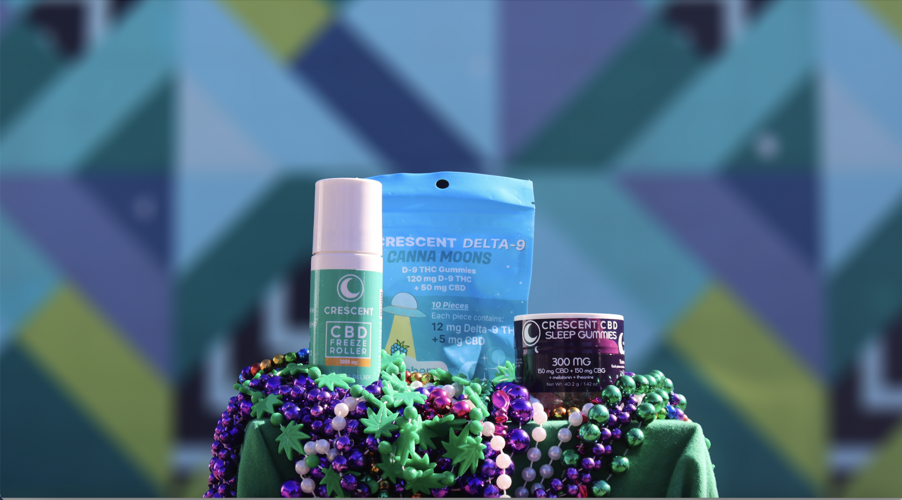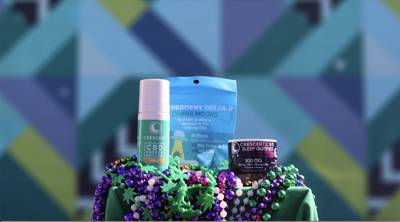Editor's Note: This story has been updated to clarify that Simply CBD, now Simply Cannabis, and Crescent Canna are two separate companies.
In New Orleans and other parts of Louisiana, it’s not hard to get your hands on a high-inducing THC seltzer. The products are now found everywhere from bars and music venues to grocery stores like Rouses.
But that could soon change.
The future of these seltzers, THC gummies and other consumable hemp products in Louisiana is up in the air, as state lawmakers weigh whether to ban them outright, tighten regulations on them or leave the law as is.
On Tuesday, the House Health and Welfare committee passed House Bill 952 by Rep. Dustin Miller, an Opelousas Democrat, that would keep much of the products legal but increase restrictions on them, including requiring manufacturers to test every batch and requiring retailers to keep the products, except for the seltzers, behind the counter.
According to Miller, it also gives the head of the state’s Alcohol and Tobacco Control to ban a hemp product manufacturer or seller after one violation of the law, instead of giving them three strikes, if the commissioner determines the first strike is “egregious” enough.
The bill also would only allow one serving per container for THC beverages. That would mean a company like Fleur de Leaf could no longer sell their THC fruit punch, lemonade and sweet tea in 16.9 ounce bottles that contain 100 milligrams of THC, intended for multiple servings.
Representatives of the Hemp Association of Louisiana testified in support of the bill, as well as Jacob Landry of Urban South, Eric Becker of Basin Street Beverages and Blaine Jennings of Virgin Hemp Farms, calling it a compromise between banning the industry outright and leaving the law as it stands. Landry and Becker’s businesses both sell their own THC seltzers.
Jennings called the bill “by far a breath of fresh air” compared to other hemp proposals, like Senate Bill 237 by Sen. Thomas Pressly, a Shreveport Republican, that would make consumable hemp products illegal. That bill passed the Senate Agriculture, Forestry, Aquaculture, and Rural Development Committee last month.
“I finally feel like I’m only being attacked a little bit instead of full force,” Jennings said.
He did, however, have a few suggestions for Miller, including changing the definition of consumable hemp products in his bill to include those without THC and not banning hemp flower outright, saying people can’t get high from it on its own.
“It would be a shame for the most innocent part of this program to be vanished because of just misunderstandings,” Jennings said.

Owner Blaine Jennings is pictured with young hemp plants Thursday, March 12, 2020, at the Virgin Hemp Farm greenhouse in Youngsville, La.
Hemp and marijuana both come from the same plant. How much THC, a psychoactive substance that can make people feel high, is in that plant determines whether it’s considered hemp or marijuana under law. If it has less than .3% THC, it’s hemp and legal. Any more than that, it’s marijuana and illegal recreationally.
Hemp can be grown for fiber, grain or CBD. The THC products come from hemp grown for CBD. Some of these products, like edibles and seltzers, can make people feel mind-altering affects, even though they contain less than .3% THC content overall.
Two federal farm bills were instrumental in legalizing the growing of hemp in the U.S. The one in 2014 legalized it for research purposes, and the one in 2018 fully legalized the growth and sale of it.
Despite not participating in the research after the 2014 law, Louisiana became one of the first states to get federal approval of its hemp program at the end of 2019.

Crescent 9 THC seltzer
Some state lawmakers say they didn’t realize that when they passed legislation in 2022 creating a market for consumable hemp products in the state that they were legalizing certain products that could get people mildly high. They say they were misled by the bill’s author, then-Speaker of the House Clay Schexnayder, a Gonzales Republican, about what the law would do.
But since then, several Louisiana businesses have jumped into the consumable hemp game, including THC seltzers.
In the New Orleans area, some owners of Simply CBD, now Simply Cannabis, launched Crescent Canna in 2019, which sold its millionth can of Crescent 9 seltzer in January. There’s also Basin Street Beverages’ Louie Louie seltzer and Fleur de Leaf’s seltzers and other THC-infused drinks like lemonade, fruit punch and sweet tea, dubbed TeaHC. Last December, Urban South Brewery entered the market as well, launching its Driftee seltzer.
Louisiana business owners said they’ve invested heavily in consumable hemp products, and that banning the industry would mean a big hit to their business, including layoffs in some cases.
“For us, we waited to invest in the category until after last legislative session, just to make sure that it was going to stick around,” Landry told Gambit. “And when it did, we put tens of thousands of dollars into creating these products and this brand.”
Jennings told a committee last month that the legislature changing regulations on a yearly basis, like adding a 1% total THC max in 2021 and a max of 8 milligrams per serving in 2022, has cost him money throwing out old packaging and products and creating new ones to make sure he was in compliance with fluctuating laws.
He said frustration over the issue has made him want to leave the state.
“I'm just tired of three years having a battle for something that y'all created that we decided to participate in,” he said.
Some of the agencies in charge have had difficulties enforcing the existing consumable hemp rules so far.
An April 2023 report by the Legislative Auditor showed that the Louisiana Department of Health had registered consumable hemp products that were illegal, such as dozens for inhalation. Then after a complaint, the department realized they didn’t have a process to remove a product once it had been registered.
In another instance, though LDH was supposed to take all products that had more than 8 milligrams of THC per serving off the registered list of consumable hemp products by Jan. 1, 2023, there were still 198 such products on the list in March 2023.
In the report, the department attributed part of the problem to changing laws surrounding consumable hemp products. It also cited “staffing issues” as making it hard for them to “timely review and register” the products.
At a Senate committee meeting in March, Louisiana Office of Alcohol and Tobacco Control Commissioner Ernest Legier Jr. similarly said he has just 30 agents statewide responsible for regulating the approximately 2,500 locations permitted to sell CBD products in the state, among other duties.
“When you combine that level of resources with some of the vagueness within the law as it exists presently, it creates opportunities that make it challenging to enforce and to ensure public safety statewide,” he said.
Legier then asked the legislature to find a compromise that would “allow our hemp industry to thrive but also stick to the will of the legislature and elected bodies with respect to what products should legally be on the market.”
Babitha Jampala, who researches industrial hemp at LSU AgCenter, told Gambit these types of issues are not uncommon in regulating a new industry.
“To be honest, these are the things that are happening in every state,” she said. “The other states have faced it in 2014 and '15, and we are facing them now.”

Plants grow beneath LED lights at a hemp farm in Broussard.
The state is playing catchup from not participating in the research program immediately following the 2014 Farm Bill, not just with regulation but also in finding the best growing methods and hemp varieties for Louisiana’s heat, humidity and longer day lengths.
Between those conditions and pests and diseases, it can be difficult to even get CBD hemp below .3% THC because the plant is so finicky, according to Jampala.
Because of this, Louisiana hemp production overall has been slower so far than some had hoped. Jampala estimated there were 500 interested farmers at an informational meeting in 2020, most of whom wanted to grow hemp for CBD because they thought it would be easier to grow and more profitable.
“But that year, some of the big farmers who got into hemp farming put in 10 acres, 15 acres, and they took very big losses,” she said, attributing it to storms and people trying to grow crops outdoors, which she does not recommend in Louisiana’s climate.
Jampala said Louisiana farmers are seeing more luck with hemp for fiber, which can be used in textiles and in car and airplane manufacturing. She said she believes the regulation for fiber and grain is “great” but that hemp for CBD should be regulated more.
"Many other crops we had at least five years or 10 years of time to learn before the farmers were interested or before the technology came to them,” she said. “This crop, everyone was so eager and looking at the market value and the prices ... So we both are learning at the same time, and that has been a challenge.”






